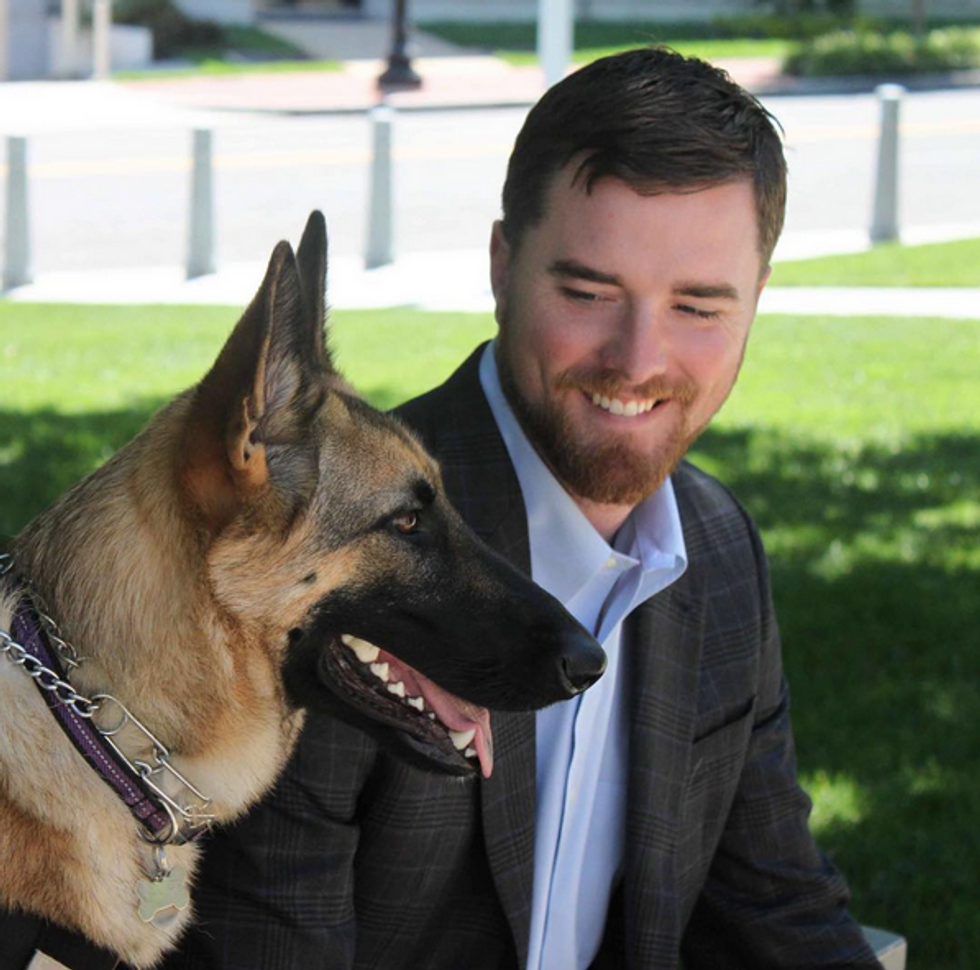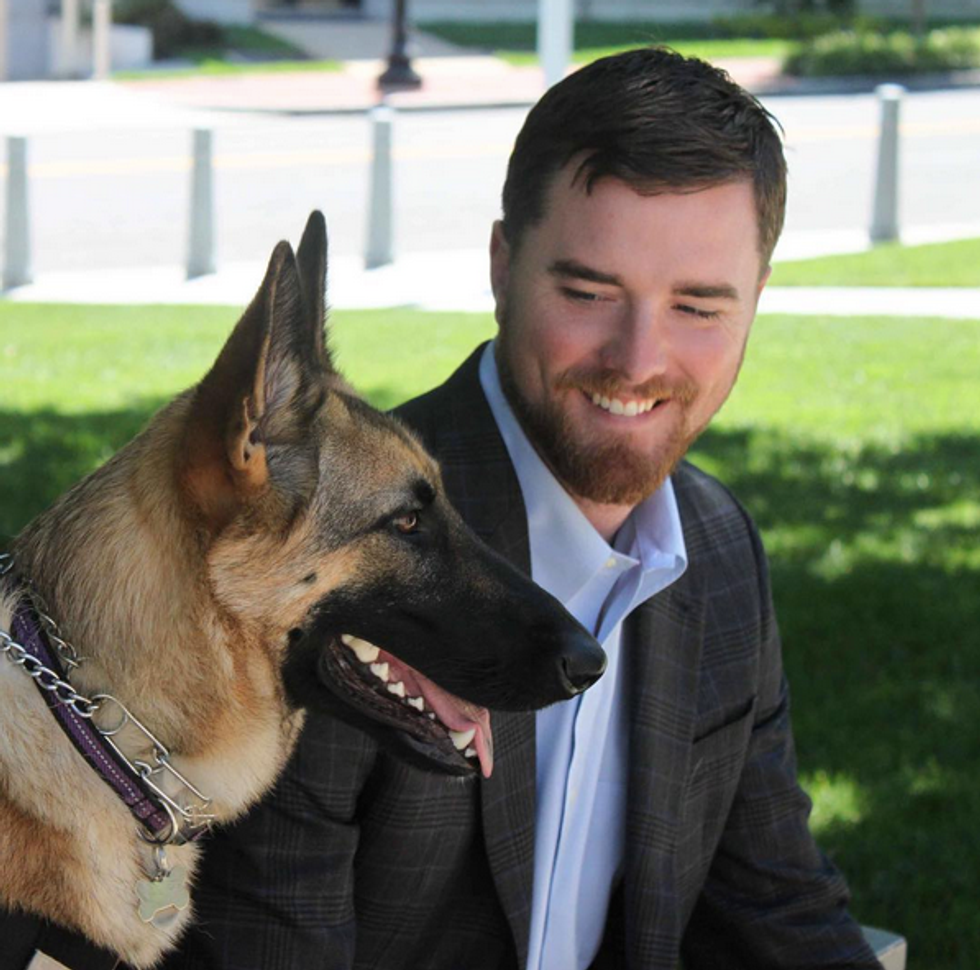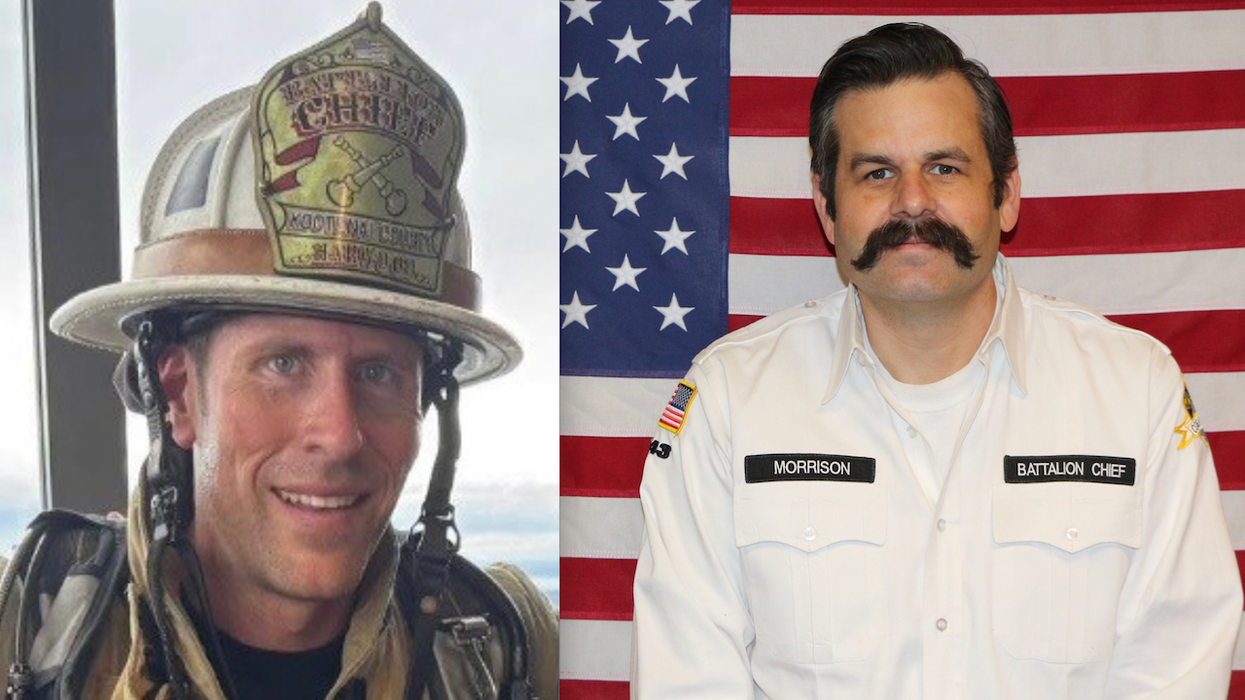
© 2025 Blaze Media LLC. All rights reserved.
The VA Currently Does Not Provide Service Dogs to Veterans With PTSD — But One Man and His Dog Are Hoping to Change That
November 11, 2015
"I feel like this is a very easy step toward positive VA reform."
WASHINGTON, D.C. — One of the first things people notice when they meet Cole Lyle is Kaya, the large, seemingly smiling German shepherd at his side.
Like Kaya, Lyle smiles too when he talks about the service dog he credits with helping him immensely in his day-to-day life. Lyle knows he's lucky: The VA currently does not provide service dogs to veterans with post traumatic stress disorder, but Lyle was able to partner up with Kaya through a third-party organization.

It wasn't long after Lyle was back in the U.S. after serving in the Marine Corps for six years and spending some time in Afghanistan as a diesel mechanic and wrecker operator before he knew something wasn't quite right. Lyle said that his struggles with PTSD aren't necessarily a result of direct combat but more so from his volunteer work at a military trauma center while he was deployed.
"Just some of the things I saw there, children coming in, seeing Marines come in with trauma, it's just difficult," Lyle told TheBlaze in an interview. "I didn't realize it until later when I came back."
Lyle said he went through a divorce around the same time he left the military, and he said, to borrow President Ronald Reagan's term, "it was a time for choosing" in his life.
"Everything that I knew kind of got ripped away from me, and I had to make some hard choices about what I really wanted to do," Lyle said.
So he quit taking his sleep medication and took a trip down to his local Veterans Affairs office. He said he had seen other veterans with service dogs and just assumed it was a service the VA would provide.
He was wrong.
Lyle got Kaya around one year ago — who he said knows when he's stressed or upset even before he does — from a nonprofit breeder and paid for her training out of his own pocket, something he has set out to change for other veterans.

The VA's website states that trained service dogs can be provided to veterans "to do specific tasks for a person that he or she cannot do because of a disability." Veterans are not charged for the dog or the dog's training, and the VA website also says the agency will pay for veterinary care and necessary equipment.
However, as Lyle, a full-time student at Texas A&M, told TheBlaze, the VA does not provide service dogs for veterans suffering with a mental disability after returning from active duty, such as PTSD. Lyle said his main focus, right now, is to spread awareness.
"I feel like this is a very easy step toward positive VA reform," Lyle said.
According to a Congressional Research Service report, there are 138,197 reported cases of veterans who have been deployed between 2000 and 2014 who struggle with PTSD.
As he sipped his coffee at Ebenezer's Coffeehouse, Kaya gently settled at his feet, Lyle confidently discussed his latest mission, the one that brought him to Washington — the P.A.W.S. Act.
The goal, Lyle said, is to continue to garner bipartisan congressional support so his vision can be turned into actual legislation that would expand the VA's definition of service dog to include those that help with PTSD.
"These dogs help with waking them up from nightmares, helping them cope with anxiety attacks, 'posting,' 'popping corners,' crowd dispersing and searching the inside of rooms prior to a veteran's entrance," according to the P.A.W.S. Act website.
The measure would also institute minimum training standards for the dogs, create a test in order to qualify trained dogs, enact a cap of one service dog per veteran, reimburse veterans who live a predetermined number of miles away from a VA facility and have dogs trained at a third-party facility as long as the dog passes the final test and place a veterinary cap of $300 per year.

Lyle said his team, which essentially consists of himself and Kaya, has laid the groundwork for the measure to be drafted into legislation for lawmakers — a processes that is still ongoing.
"I've gotten pushback and some questions from certain members of Congress — and they're pretty weak, honestly — but they say, 'Why not equine therapy?' or 'If you're going to expand alternative therapies, why not expand alternative therapies more aggressively?'" Lyle said. "I don't disparage those other therapies, but you can't fit a horse through an airport."
"We need Congress to stand up and do something in terms of addressing these issues," he said. "And to be quite honest with you, I feel like this could be a bridge to the large question of addressing mental health issues in this country. Right now my focus is service dogs for veterans with PTSD because personally I have friends who committed suicide because of post traumatic stress, and it hurts, but I want to do something so that future generations of veterans don't struggle with this same issue."
The VA website says based on the most recent data available to the government agency, the suicide rate among male veterans associated with the VA was 38.3 per 100,000 and 12.8 per 100,000 females in 2009. That same website also cites a study from the National Comorbidity Survey which showed that PTSD was the only one of six anxiety diagnoses that was directly associated with suicidal ideation or attempts. The study's findings "pointed to a robust relationship between PTSD and suicide after controlling for comorbid disorders," the VA's website states.
The website also cited a study from the Canadian Community Health Survey that found that those with PTSD are at a higher risk for suicide attempts even after controlling for other mental disorders and physical illnesses.
"One thing that a dog does that a pill doesn't do is give you a sense of purpose again," Lyle said.
Lyle said that occasionally he still has bad days, especially when he lost another friend in recent months to suicide, but those times are easier to deal with with Kaya next to him. As he walked down the street toward Capitol Hill, his smile matched Kaya's as they prepared for another full day of lobbying lawmakers.
Want to leave a tip?
We answer to you. Help keep our content free of advertisers and big tech censorship by leaving a tip today.
Want to join the conversation?
Already a subscriber?
more stories
Sign up for the Blaze newsletter
By signing up, you agree to our Privacy Policy and Terms of Use, and agree to receive content that may sometimes include advertisements. You may opt out at any time.
Related Content
© 2025 Blaze Media LLC. All rights reserved.
Get the stories that matter most delivered directly to your inbox.
By signing up, you agree to our Privacy Policy and Terms of Use, and agree to receive content that may sometimes include advertisements. You may opt out at any time.





